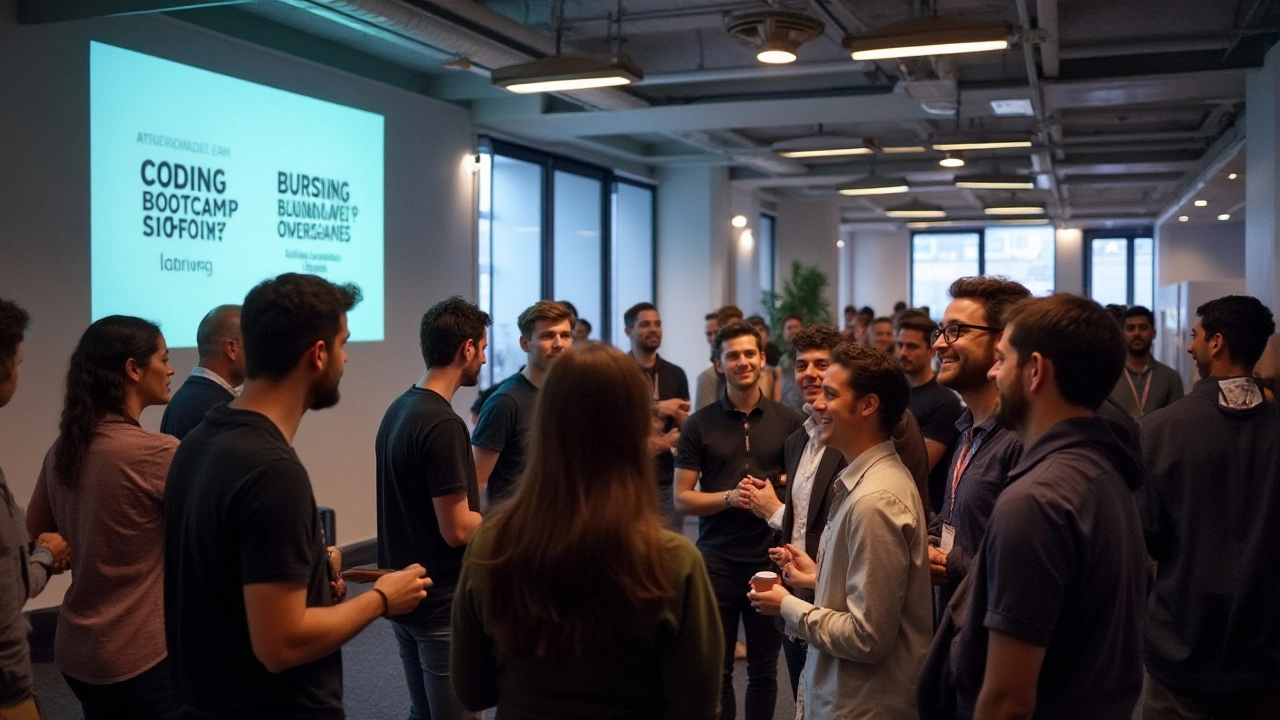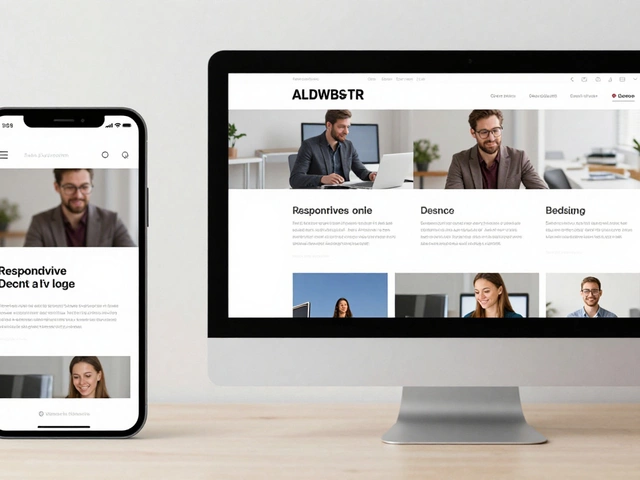In the bustling world of technology, the path to becoming a full-stack developer isn't set in stone. While some tech enthusiasts follow the traditional route of earning a computer science degree, others take alternative paths that lead directly to success.
So, do you really need that degree to land a full-stack developer job, or can your love for coding and a strong portfolio speak louder?
The tech industry has opened doors to diverse learning avenues perfect for aspiring developers. Emphasizing skills and practical experience over formal education, firms now look for creativity, problem-solving ability, and hands-on involvement in real-world projects.
- The Role of a Full-Stack Developer
- Educational Paths: Degree vs. No Degree
- The Value of Coding Bootcamps and Online Courses
- Building a Portfolio: Practical Experience Matters
- Networking and Landing Your Dream Job
The Role of a Full-Stack Developer
The versatile career of a full-stack developer is both demanding and rewarding, offering a unique intersection between innovative problem-solving and intricate design aesthetics. A full-stack developer is expected to master both front-end and back-end technologies, bridging the gap between the world of servers and user interfaces. As a jack-of-all-trades in the tech world, they wield the power to craft seamless digital experiences, making them indispensable assets to dynamic teams. Their day-to-day work involves managing databases, setting up server-side software, redesigning user interfaces, and ensuring the harmony between the client-side and server-side of any application.
Understanding diverse languages like HTML, CSS, and JavaScript for the front-end, combined with back-end frameworks like Node.js or Python, is critical. Additionally, database management using systems such as MySQL or MongoDB is part of the job description. Full-stack developers toggle between design, operational tasks, and optimization of both the software’s user-friendliness and functionality—ensuring seamless, bug-free experiences for end-users. Their adaptability and ability to quickly learn and apply new tech make them capable of addressing technical challenges from all angles. Interestingly, a survey by Stack Overflow once pointed out that around 50% of full-stack developers contributed to open source projects, highlighting the communal spirit and collaborative nature of the role.
“The best solutions often emerge from the synergy of diverse skills, where design meets development,” said Elon Musk at a 2023 Tech Conference, spotlighting the need for well-rounded developers in an ever-evolving digital landscape.
In addition to coding skills, soft skills such as effective communication, teamwork, and problem-solving are indispensable. Being a full-stack developer often means acting as a liaison between different teams and departments, translating technical requirements into practical designs. Thus, developers should be meticulous listeners and clear communicators, ensuring they understand client needs and the market demands. The role's multifaceted nature implies that a developer must stay tech savvy and continually evolve their learning curve. Given the ongoing technological advancements, they often embrace life-long learning, either through online courses, boot camps, or professional networking groups where they exchange ideas and cultivate new skills.
Educational Paths: Degree vs. No Degree
The question of whether a computer science degree is essential for a full-stack developer role has sparked many a debate in recent years. Traditionally, earning a degree was viewed as the golden ticket into the tech industry, a seal of approval that demonstrated one’s prowess in programming and algorithmic thinking. A degree often means exposure to a broad spectrum of computer science theories and practices, laying a solid foundation in this ever-evolving field. However, the fast-paced, dynamic nature of technology has made it such that the ability to adapt and learn continually can often outweigh the benefits of formal academia. Employers are now realizing that practical experience and demonstrated skills often carry more weight than a framed degree certificate.
For many, coding bootcamps and online courses have emerged as viable alternatives. These options offer immersive, hands-on curriculum designed to teach essential skills in a matter of months, a stark contrast from the years spent in university settings. Take for example, coding bootcamp graduates who, according to SwitchUp, receive considerable salary increases upon completing their programs. Bootcamps are tech-focused from start to finish. They teach industry-relevant skills and provide the kind of real-world experience employers are looking for. Plus, they frequently incorporate opportunities for networking and placements, easing the transition into the workforce.
Though each educational path has its merits, it's important to consider what aligns best with your personal learning style, career goals, and circumstances. A degree can teach patience, time management, and a comprehensive understanding of theoretical concepts. On the other hand, bootcamps and online courses often foster creativity and innovation among students by emphasizing practical problem-solving and teamwork. An emerging coder should assess where their learning preferences lie and choose the path that suits them best.
"The future belongs to those who learn more skills and combine them in creative ways." - Robert Greene
In academic terms, while degrees remain a common entry requirement for many tech positions, recent data reveals that approximately 25% of professional developers are self-taught. This reveals a significant paradigm shift in the tech landscape. Hiring managers are increasingly on the lookout for portfolios that showcase a candidate’s ability to create impactful solutions and work within diverse teams, rather than strictly their academic credentials. This means, when considering if a CS degree is required, remember that skill development and the creation of meaningful projects can significantly influence your employability.

The Value of Coding Bootcamps and Online Courses
In today's rapidly evolving technology landscape, the traditional four-year degree isn't the only ticket to a career in tech. The boom of coding bootcamps and online courses has presented a dynamic alternative for those looking to break into the field of full-stack development without the time or financial commitment of a conventional college education. These options have opened up the industry to a wider range of individuals, from recent high school graduates and career switchers to hobbyists with a passion for coding.
One might wonder about the credibility of these non-traditional formats. Well, many coding bootcamps offer a curriculum that's tightly focused on practical skills that are directly applicable to real-world projects. Unlike a computer science degree that might delve into theoretical aspects, bootcamps prioritize hands-on coding. Short, intensive, and immersive, they usually last between three to six months, ensuring that learners gain a comprehensive understanding of both front-end and back-end technologies without unnecessary detours.
Their significance is highlighted by Chris Wanstrath, co-founder of GitHub, who once said, "Coding bootcamps offer a foundational education as part of a broader journey; they have a place just like colleges do." With curricula shaped by current industry demands, bootcamps equip students with knowledge of popular frameworks and languages such as JavaScript, Python, and Ruby on Rails, giving them an edge in the competitive job market.
Along with bootcamps, online courses offered by platforms like Coursera, Udemy, and edX have also gained significant traction. These platforms offer flexibility, allowing learners to pace themselves and study from anywhere, anytime. Monthly subscriptions or one-time payments make these courses more affordable than traditional education. Besides coding languages, they often include topics like data structures, algorithms, and even soft skills like project management and communication, rounding off a well-prepared candidate.
Conveniently, many of these platforms provide certifications upon course completion, serving as a testament to a learner's dedication and capability. While recruiters might value in-depth skill demonstrations more than formal certificates, they're still an excellent addition to any resume or LinkedIn profile. These curated courses can keep learners updated with the latest technological advances, ensuring their skills stay relevant in the always-evolving tech sector.
For anyone weighing the decision to enter a full-stack developer career, these educational pathways pose a viable proposition. They not only offer flexibility but often connect students with a network of professionals, mentors, and peers, many of whom could be key contacts when job hunting. More and more, companies are recognizing these pathways as legitimate and effective talent pipelines. After all, in the realm of technology, your portfolio can highlight your skills more than a traditional degree ever could.
Building a Portfolio: Practical Experience Matters
When it comes to landing a full-stack developer job, having a robust portfolio is often the ace up your sleeve. Imagine walking into an interview and instead of just talking about what you can do, you can showcase a collection of projects that demonstrate your skills in a concrete way. A solid portfolio tells the story of your journey as a developer, highlighting your technical prowess, creativity, and problem-solving abilities. It's the digital equivalent of a modern artist's gallery, painting a clear picture of your expertise in both the front-end and back-end ecosystems.
Start by focusing on projects that emphasize your ability to solve real-world problems. This isn't just about throwing together a few pieces of code; it's about creating usable and maintainable applications. Many successful full-stack developers emphasize that employers look for candidates who can demonstrate that they understand the user experience and technical functionality. Consider contributing to open-source projects or creating applications that solve everyday inconveniences. This experience will not only bolster your practical skills but also showcase your initiative and commitment to learning, a vital characteristic in the tech world.
While building your portfolio, pay attention to the diversity of tools and tech skills you incorporate. Demonstrating versatility with various frameworks, languages, and databases can make a significant impression. For instance, knowing how to juggle React, Angular, or Vue on the front-end with Node.js, Django, or Laravel on the back-end illustrates your ability to seamlessly navigate the full technology stack. Whether you have a degree or not, practical experience with these tools can place you on an equal footing with degree holders.
"A portfolio of only a single skill can be limiting," says John Resig, the creator of jQuery. "Diverse experiences build a diverse mindset, one that sees solutions from multiple perspectives."
Don't forget to document your journey. Write about your projects and share the challenges you faced and how you overcame them. A blog or personal website could serve as an excellent medium for this. Not only does this process help in refining your understanding, but it also signals your communication skills to potential employers. Highlight your specific roles in each project, and explain how you used certain tools or methodologies effectively, reinforcing your suitability for a full-stack role.
To give you some perspective, here's an interesting fact: according to a recent Stack Overflow survey, 87% of developers learn new languages, frameworks, or tools on their own—outside of a formal educational setting. This statistic underscores the value of self-directed learning, which can be profoundly demonstrated through your project contributions.
Finally, remember that as the tech landscape evolves, so should your portfolio. Regularly updating it with new projects and skills is important to stay relevant in this fast-paced industry. Include feedback from users or employers if possible, as it adds credibility and demonstrates your ability to adapt based on constructive criticism. This dynamic approach not only enhances your portfolio but also keeps you aligned with emerging tech trends. All in all, whether you're a career switcher or a recent graduate, a well-crafted portfolio remains one of the most critical tools for establishing yourself as a competent and proficient full-stack developer.

Networking and Landing Your Dream Job
Networking is more than just a buzzword in the tech industry; it's a crucial element to carving a fulfilling career as a full-stack developer. Many have landed their dream job thanks to robust networks, often bypassing the traditional route of job applications. In the realm of technology, where rapid transformation is the norm, who you know can open doors that your resume alone might not. It's common for developers to hear about job openings through a friend of a friend, proving there is truth to the adage: "It's not just what you know, but who you know." Building rapport with industry professionals can not only lead you to potential job opportunities but also keep you aware of trends and skills in demand.
Begin by joining communities related to your interests. Meetups, both virtual and physical, are fantastic places to connect with other developers. Platforms like GitHub are not only for showcasing your work but also for engaging with a community that appreciates collaboration. Here, contributions to open source projects could catch the eye of a potential employer. LinkedIn remains a formidable tool, but it's essential to go beyond just connecting. Engage with content, participate in discussions, and present yourself as someone invested in the tech community. Attending conferences and hackathons can also put you on the radar of recruiters scouting for talented developers.
To succeed, aim for high-quality connections over quantity. A meaningful network can serve as a well of knowledge and opportunity. When it comes to the hiring process, companies often seek recommendations from people they trust. A personal referral from someone within the organization can enhance your candidacy significantly. Indeed, a LinkedIn survey found that 85% of all jobs are filled through networking. As a full-stack developer, illustrating your communication and team work skills through networking can give you a competitive edge.
"Success is determined by not just having connections, but by cultivating meaningful relationships," shares Tim Ferriss, renowned author and entrepreneur. Tim's insight resonates in every corner of the tech industry, where trust and rapport often lead to career breakthroughs.
Think of networking as a two-way street. It's about giving, listening, and providing value, as much as it is about receiving. Show genuine interest in others' work. Volunteer for projects or mentorship roles when possible. This reciprocity shapes your professional identity positively and fosters goodwill in the industry. By weaving yourself into the fabric of tech communities, you're not only increasing your visibility but also contributing to a wider ecosystem. Remember, each interaction is an opportunity to learn and possibly move closer to your dream job.
Building your network is one thing, but leveraging it effectively is where the magic happens. Once a connection is established, follow up with informative content or insightful questions. Express gratitude for any help you've received. A simple thank you can leave a lasting impression. Use these discussions as stepping stones to inform yourself about what full-stack developer roles entail at different companies. This knowledge is beneficial when tailoring cover letters or during interviews.
Landing your dream job as a full-stack developer may very well begin with expanding your network, but it's the depth and value of these connections that truly contribute to success. In the dynamic tech field, where change is constant, strong connections ensure you're both informed and well-positioned for new opportunities. Equip yourself well, share generously, and your fingers will likely brush against that door handle of opportunity sooner than expected.





